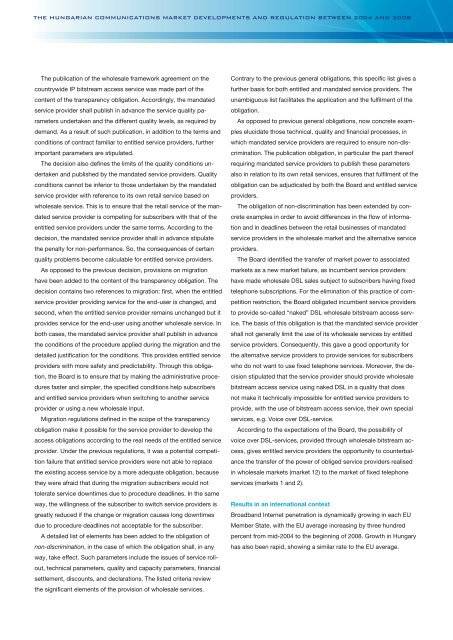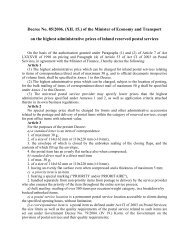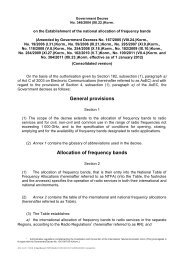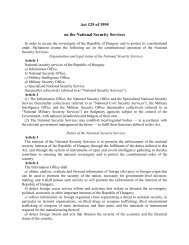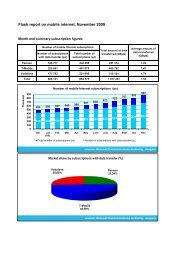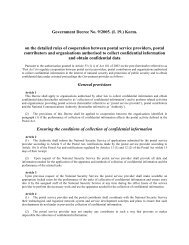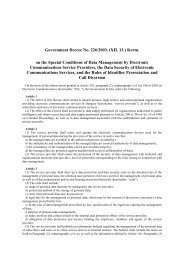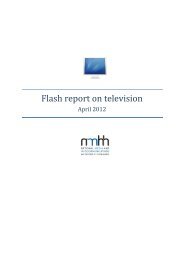The Hungarian Communications Market Developments and ...
The Hungarian Communications Market Developments and ...
The Hungarian Communications Market Developments and ...
You also want an ePaper? Increase the reach of your titles
YUMPU automatically turns print PDFs into web optimized ePapers that Google loves.
<strong>The</strong> <strong>Hungarian</strong> <strong>Communications</strong> <strong>Market</strong> <strong>Developments</strong> <strong>and</strong> Regulation between 2004 <strong>and</strong> 2008<br />
<strong>The</strong> publication of the wholesale framework agreement on the<br />
countrywide IP bitstream access service was made part of the<br />
content of the transparency obligation. Accordingly, the m<strong>and</strong>ated<br />
service provider shall publish in advance the service quality parameters<br />
undertaken <strong>and</strong> the different quality levels, as required by<br />
dem<strong>and</strong>. As a result of such publication, in addition to the terms <strong>and</strong><br />
conditions of contract familiar to entitled service providers, further<br />
important parameters are stipulated.<br />
<strong>The</strong> decision also defines the limits of the quality conditions undertaken<br />
<strong>and</strong> published by the m<strong>and</strong>ated service providers. Quality<br />
conditions cannot be inferior to those undertaken by the m<strong>and</strong>ated<br />
service provider with reference to its own retail service based on<br />
wholesale service. This is to ensure that the retail service of the m<strong>and</strong>ated<br />
service provider is competing for subscribers with that of the<br />
entitled service providers under the same terms. According to the<br />
decision, the m<strong>and</strong>ated service provider shall in advance stipulate<br />
the penalty for non-performance. So, the consequences of certain<br />
quality problems become calculable for entitled service providers.<br />
As opposed to the previous decision, provisions on migration<br />
have been added to the content of the transparency obligation. <strong>The</strong><br />
decision contains two references to migration: first, when the entitled<br />
service provider providing service for the end-user is changed, <strong>and</strong><br />
second, when the entitled service provider remains unchanged but it<br />
provides service for the end-user using another wholesale service. In<br />
both cases, the m<strong>and</strong>ated service provider shall publish in advance<br />
the conditions of the procedure applied during the migration <strong>and</strong> the<br />
detailed justification for the conditions. This provides entitled service<br />
providers with more safety <strong>and</strong> predictability. Through this obligation,<br />
the Board is to ensure that by making the administrative procedures<br />
faster <strong>and</strong> simpler, the specified conditions help subscribers<br />
<strong>and</strong> entitled service providers when switching to another service<br />
provider or using a new wholesale input.<br />
Migration regulations defined in the scope of the transparency<br />
obligation make it possible for the service provider to develop the<br />
access obligations according to the real needs of the entitled service<br />
provider. Under the previous regulations, it was a potential competition<br />
failure that entitled service providers were not able to replace<br />
the existing access service by a more adequate obligation, because<br />
they were afraid that during the migration subscribers would not<br />
tolerate service downtimes due to procedure deadlines. In the same<br />
way, the willingness of the subscriber to switch service providers is<br />
greatly reduced if the change or migration causes long downtimes<br />
due to procedure deadlines not acceptable for the subscriber.<br />
A detailed list of elements has been added to the obligation of<br />
non-discrimination, in the case of which the obligation shall, in any<br />
way, take effect. Such parameters include the issues of service rollout,<br />
technical parameters, quality <strong>and</strong> capacity parameters, financial<br />
settlement, discounts, <strong>and</strong> declarations. <strong>The</strong> listed criteria review<br />
the significant elements of the provision of wholesale services.<br />
Contrary to the previous general obligations, this specific list gives a<br />
further basis for both entitled <strong>and</strong> m<strong>and</strong>ated service providers. <strong>The</strong><br />
unambiguous list facilitates the application <strong>and</strong> the fulfilment of the<br />
obligation.<br />
As opposed to previous general obligations, now concrete examples<br />
elucidate those technical, quality <strong>and</strong> financial processes, in<br />
which m<strong>and</strong>ated service providers are required to ensure non-discrimination.<br />
<strong>The</strong> publication obligation, in particular the part thereof<br />
requiring m<strong>and</strong>ated service providers to publish these parameters<br />
also in relation to its own retail services, ensures that fulfilment of the<br />
obligation can be adjudicated by both the Board <strong>and</strong> entitled service<br />
providers.<br />
<strong>The</strong> obligation of non-discrimination has been extended by concrete<br />
examples in order to avoid differences in the flow of information<br />
<strong>and</strong> in deadlines between the retail businesses of m<strong>and</strong>ated<br />
service providers in the wholesale market <strong>and</strong> the alternative service<br />
providers.<br />
<strong>The</strong> Board identified the transfer of market power to associated<br />
markets as a new market failure, as incumbent service providers<br />
have made wholesale DSL sales subject to subscribers having fixed<br />
telephone subscriptions. For the elimination of this practice of competition<br />
restriction, the Board obligated incumbent service providers<br />
to provide so-called “naked” DSL wholesale bitstream access service.<br />
<strong>The</strong> basis of this obligation is that the m<strong>and</strong>ated service provider<br />
shall not generally limit the use of its wholesale services by entitled<br />
service providers. Consequently, this gave a good opportunity for<br />
the alternative service providers to provide services for subscribers<br />
who do not want to use fixed telephone services. Moreover, the decision<br />
stipulated that the service provider should provide wholesale<br />
bitstream access service using naked DSL in a quality that does<br />
not make it technically impossible for entitled service providers to<br />
provide, with the use of bitstream access service, their own special<br />
services, e.g. Voice over DSL-service.<br />
According to the expectations of the Board, the possibility of<br />
voice over DSL-services, provided through wholesale bitstream access,<br />
gives entitled service providers the opportunity to counterbalance<br />
the transfer of the power of obliged service providers realised<br />
in wholesale markets (market 12) to the market of fixed telephone<br />
services (markets 1 <strong>and</strong> 2).<br />
Results in an international context<br />
Broadb<strong>and</strong> Internet penetration is dynamically growing in each EU<br />
Member State, with the EU average increasing by three hundred<br />
percent from mid-2004 to the beginning of 2008. Growth in Hungary<br />
has also been rapid, showing a similar rate to the EU average.


